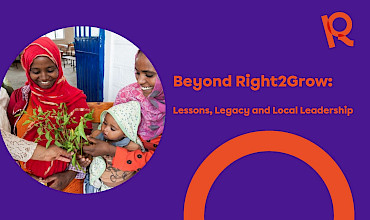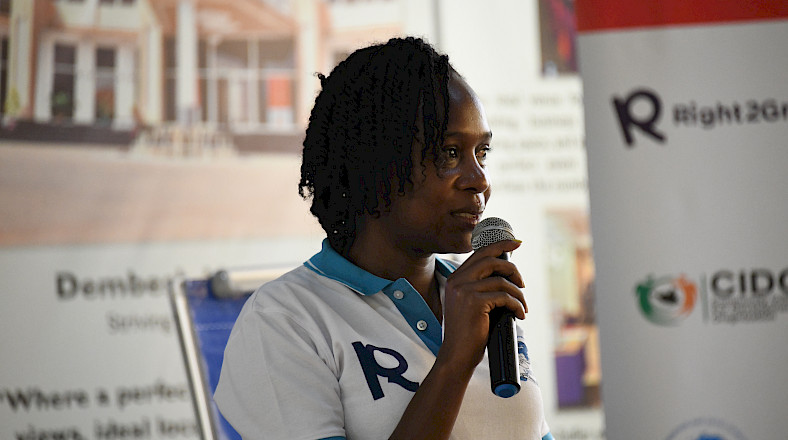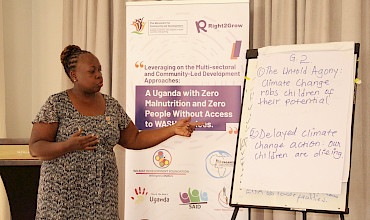
Today on World Food Day 2024, we want to launch our lobby campaign towards the Nutrition4Growth summit 2025.
In 2021, governments and private sector donors pledged more than US$27 billion at the Tokyo Nutrition for Growth (N4G) Summit to address the global malnutrition and hunger crisis. Despite these efforts some 86 million children below five face various forms of malnutrition in Africa, 63 million are stunted, 10 million are overweight and three million are wasted- meaning that they have low weight for their height (AFDB). The Food and Agriculture Organisation (FAO) states that there are more stunted children today than 20 years ago and that Africa's stunting statistics are on the rise. These statistics have dire consequences for the children involved. Poor nutrition keeps school-age children from realizing their (educational) potential, it diminishes their work productivity and hinders much- needed contributions to society. In sum, it negatively impacts economic growth (AFDB).
As the world convenes next year on the 27th and 28th of March in Paris for the N4G Summit, it provides great momentum to advocate for strong political will and renewed commitments ending malnutrition. There is a gap between past N4G-commitments and rising numbers of malnutrition. To bridge that gap, information and cooperation between duty-bearers and rights holders is needed.
In June 2024 Right2Grow, the SUN Network CASCADE and GAIN came together to organise an accountability workshop, for joint advocacy towards N4G 2025 with CBO’s, CSO’s and NGO’s, with the Eastern and Southern Region of Africa. Right2Grow representatives from Uganda, South Sudan and Ethiopia attended, alongside representatives fromTanzania, Somalia and Kenya.
Off the back of this workshop, two R2G policy recommendations were adopted in the Regional Resolution of the 73rd Conference of Ministers of Health of Eastern and Southern Africa. These recommendations focus on: (1) Strengthening multisectoral collaboration, including the engagement of CSOs, for advocacy and investment in nutrition, and (2) Adopting innovative approaches such as the Triple Nexus (Humanitarian, Development and Peace) model to address nutrition and food crises, including humanitarian situations.
For Right2Grow, the Shift the power principle is critical to everything that we do. Therefore, our priority was to mobilise the inclusion of local communities, CBO’s, CSO’s and NGOs in the run up to the N4G Paris Summit. To ensure that countries were being represented from a local perspective, the Right2Grow consortium has led a taskforce to prepare national position papers with the CSO representatives, assessing their existing commitments and consolidating positions and recommendations for the future. For the Right2Grow countries there are three key recommendations moving forwards:
Enhanced Monitoring of Outcomes
All three countries take the position that transparent, high-quality data is key for informed resource allocation, decision-making, timely interventions, and sustained progress in nutrition and related sectors. This is not just pertinent for decision-making processes but also maintaining accountability with met or unmet commitments. This includes timely monitoring and reporting of nutrition outcomes by national and local government bodies.
Clear and effective Governance of Nutrition Policies
Countries are still struggling with the lack of dedicated members or funding structures within their national governments. For Uganda and South Sudan this comes down to out of date National Nutrition policies that are yet to be reviewed. Both countries are experiencing emerging themes that are influencing their nutrition outcomes that need urgent attention Both countries seek for an expedited review of their national policies. For Ethiopia the primary recommendation is to have a centralised source of funds reserved for nutrition within the national budget, which in turn will help with transparency and tracking expenditures.
Stakeholder Mobilisation & Multisector Engagement
All three countries restate the importance of multisectoral engagement and mobilisation. The voices of CSOs and local communities are essential in determining the priorities of social policy. Taking on an inclusive approach is more important than ever, since countries are increasingly facing challenges related to climate change, migration and conflict. These unpredictable challenges require holistic and cross-sectoral solutions, especially when it comes to linking WASH solutions with nutrition outcomes.
Many thanks and congratulations goes to the hard work of all the CSOs, and partners involved in this process. These position papers will play a critical role in our lobby work in the national and international arena against malnutrition as we continue working towards the Nutrition4Growth summit in 2025. The posi
You can find all 3 position papers on the links below:
Uganda: Revisiting Approaches and Strategies - Enhancing efforts to attain Uganda’s Nutrition for Growth (N4G) Commitments
South Sudan: Revamping the Consolidated Effort to Combat Malnutrition in South Sudan
Ethiopia: Renewing Commitment and Accelerating Action: Enhancing Ethiopia's Nutrition Strategy to Meet the Tokyo N4G Summit Goals
Back to overview

